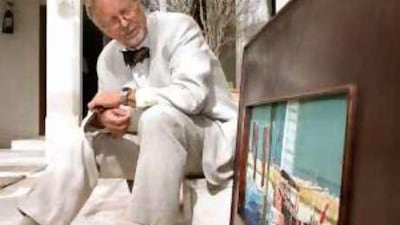Dr Martin Giesen is an artist and a professor of art history in the Visual and Performing Arts at the American University of Sharjah. He lives in Sharjah.
I was born and brought up in Germany. After teaching at universities in Lebanon, Saudi Arabia and Canada, I arrived in Sharjah in 1997, having been hired by the then new American University of Sharjah (AUS) to do some curriculum consultation. I was offered the job of Dean of the School of Architecture and Design and decided to stay.
AUS is an extraordinarily interesting place to work. Having seen it since the beginning, I can see the fruits of our labours. Fall 1997 was the first semester and we didn't have any of the necessary equipment to run the design school; it was pioneering work, putting the regulations in place, planning the curriculum, hiring qualified faculty and buying the equipment. It was an active and exhausting time, but productive.
The authorities here have been extremely generous to allow higher education institutions to develop quickly; but we need to ensure that potential talents in all fields are identified and put through an education system that can bring them to fruition. A flourishing society needs to be made up of a whole range of people: vets, ballet dancers, imams, solar engineers and museum curators; and all these needs should be met by the people within that community. If a semblance of local tradition is to be kept, people who have grown up here need to do the jobs. There are many courses here offering business management and IT skills, but can the UAE afford to populate the country with MBAs and computer specialists? Who's going to take care of the spirit?
I am in the process of establishing a visual and performing arts programme at AUS, which will consist of courses in art, music and theatre. We staged a performance of Romeo and Juliet last semester. Large numbers of students, including visiting school groups from Abu Dhabi, were seeing their peers acting in a Shakespeare play for the first time and they were blown away with pride and empowerment.
Iran and the UAE are the only two countries in the Islamic world where the number of women entering university is higher than men, which shows that higher education here is in good hands. Women do better in school than men and I think that's because they have more to prove and, as a result, are more motivated. In the past, many people have sent their children abroad to study, but as standards here improve, more are staying.
We live in an extraordinary place at a unique moment in history. In the future, historians may well speak of this decade as a Renaissance. The UAE may be the Florence of the 21st Century.
I have been painting for 50 years, and go through phases of high and low creative output. My work has been exhibited in the Middle East and in Canada, but as the day job expands, it becomes more difficult to put aside the chunks of time to focus on painting. I have finished about 12 pieces this year and have finally done some work on Abu Dhabi, of the Sheikh Zayed Mosque under construction, as well as the Emirates Palace with an improved foreground.
Working with young people keeps the child in me alive. As classes come through, their age remains the same, so my mind doesn't recognise that I'm getting older. I am incredibly lucky to see their progression from rather lazy kids to interested individuals; from people who run with the herd, to people who express their opinions, regardless of what others may think. What could be a better life?
Talking of time and age, I realised recently that I had met my future wife 41 years ago to the day. We met in a French class at college in Ohio, where she was studying music and I was an exchange student. We now have three daughters who are spread all over the world. We've been discussing where to retire to for the last 20 years, but still haven't reached any consensus or conclusion. We just take each day as it comes; I am happy to remain wherever the fruits of my labours still matter.
kboucher@thenational.ae

